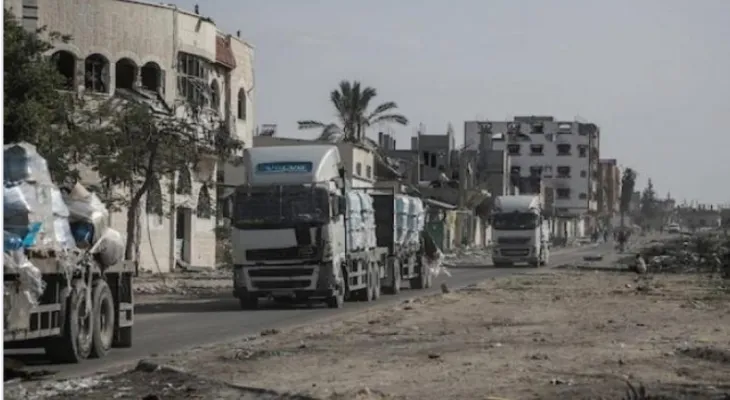Search here
Newspaper
Search here

Arab Canada News
News

Published: May 19, 2025
In a new development reflecting the magnitude of the accumulated political and humanitarian pressures, Israel announced today, Monday, the resumption of humanitarian aid entry into the Gaza Strip, following the approval of the Security Cabinet (the Cabinet) on the decision late at night, under increasing international pressure, especially from the United States, due to the worsening famine and the collapse of living conditions in the besieged region.
Entry of the first aid trucks
The Israeli military announced this morning the allowance for 9 trucks loaded with humanitarian aid to cross into Gaza through the Kerem Shalom crossing, in a step that is the first of its kind after weeks of intensified siege and ongoing military escalation.
The military statement clarified that these trucks are heading directly to the warehouses of associations and relief organizations inside the sector, where international organizations will take responsibility for sorting and distributing them to the most affected and needy families, amid the near-total collapse of essential services inside Gaza.
International pressure and unclear promises
This development came after escalating demands from international relief organizations to facilitate the access of aid, amid reports confirming that the region is facing a real famine threatening the lives of hundreds of thousands, with acute shortages of food, water, and medication, and the spread of diseases resulting from malnutrition and deteriorating public hygiene.
Despite the entry of these nine trucks, observers believe that the step is still limited and does not meet the catastrophic needs suffered by more than two million Palestinians trapped in tragic conditions.
Anticipation for more aid
According to the Israeli military radio, additional batches of aid may enter in the coming hours as part of the “ongoing international efforts” to secure the most basic needs of the sector's residents, but these statements lack a clear timeline, leaving the fate of thousands of Gazan families suspended between promises and waiting.
Background of the decision and escalating pressures
Notably, the decision to resume the entry of aid was not subjected to a vote within the Cabinet, indicating an emergency consensus imposed by internal and external circumstances. The threats issued by several ministers in Benjamin Netanyahu’s government to withdraw if aid was allowed in have receded, as they were later described as mere “insincere threats,” according to Israeli media.
Media sources quoted informed officials that the decision came as a result of direct pressures from the United States and several European countries, which warned about the humanitarian and moral ramifications of continuing the siege, amid confirmed reports of fatalities due to hunger, especially among children and the elderly.
Netanyahu justifies the decision with military objectives
In an attempt to justify the decision to right-wing circles within his government, Israeli Prime Minister Benjamin Netanyahu issued a statement saying that the entry of aid came “based on the Israeli military's recommendation” and as part of an “operational need” that allows for the continuation of intense battles against Hamas.
Netanyahu confirmed that “providing basic quantities of food aims to prevent the worsening of the hunger crisis in Gaza,” emphasizing that this does not mean a reduction in the pace of military operations, but is considered a condition for their continuation without a humanitarian cost that is difficult to control internationally.
Comments